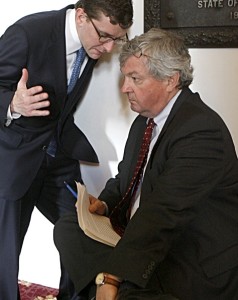Pelham: Vermont’s April tax revenue numbers ‘a big miss’

By Bruce Parker | Vermont Watchdog
‘BIG MISS’: Tom Pelham, former deputy secretary of administration under Gov. Jim Douglas, said April’s sagging income tax revenues were a ‘big miss.’
MONTPELIER, Vt. — Despite upbeat projections, April’s monthly revenues report shows general fund revenues in Vermont are down sharply due to lower-than-expected income tax receipts — a shortfall former Deputy Secretary of Administration Tom Pelham called “a big miss.”
“The target for April missed by almost 15 percent, or $23 million dollars — that’s a big miss,” Pelham, who served under Gov. Jim Douglas, told Vermont Watchdog.
April’s general fund revenues of $206.35 million were down $4.86 million, or 2.3 percent below the projected monthly target of $211.21 million, according to the report released this week by Secretary of Administration Jeb Spaulding.
The drop came primarily from a personal income tax revenues shortfall of $22.85 million, or 14.79 percent. Income tax receipts of $131.66 million were well under the expected $154.51 million.
Spaulding attributed April’s low income tax revenues to savvy investors who booked capital gains last year.
“The thinking around the country is that this happened because sophisticated taxpayers accelerated capital gains more than expected in anticipation of federal tax changes that were effective in 2013,” Spaulding said.
The secretary of administration put a positive spin on the numbers, saying, “We do not believe April’s income tax results indicate a change in our steady positive economic trajectory.”
But Pelham, who served three prior administrations and was commissioner of finance and management under former Gov. Howard Dean, said weak income tax revenues in the biggest month of tax season signal big problems for Vermont’s 2015 budget.
“The general fund growth projection for 2015 is 4.8 percent. We’re only running at a rate of 2.6 percent this year, and that includes a windfall from the estate tax. If these estimates are off for April, the probability is that the revenue estimate for 2015 is not on track,” he said.
Spaulding explained in the report that April’s numbers, while down due to low income tax receipts, benefitted from an unexpected windfall in the estate tax category.
“April general fund receipts were heavily impacted by an unprecedented level of collections in the estate tax component — just under $19 million, exceeding the next closest month back in 2006 by almost $3.3 million,” Spaulding said.
Pelham told Vermont Watchdog that a one-time spike in the estate tax, while significant, can’t mask the deeper structural problem of dwindling income tax receipts.
“There was a large inheritance estate tax receipt in April of 17.6 million, which to a great extent offsets the lower income tax receipts,” he said. “The problem there is that inheritance and estate taxes are one-time revenues — no one really knows when someone is going to die and file an estate tax … the shortfall in personal income is much more structural in nature.”
The April numbers should be a warning to lawmakers hashing out differences between the House and Senate versions of the budget set to take effect July 1. The current budget proposals assume significant growth for the general fund, yet year-over-year growth after 10 months of fiscal year 2014 stands at just 2.6 percent, setting up a major gap between revenues and spending for 2015.
If the Legislature approves a 2015 budget that includes 5 percent growth in spending while revenue growth hovers around 2.6 percent, the move would signify a departure from two decades of sustainable spending in Vermont.
“This history here goes back to the early ‘90s when the state got itself into some fiscal trouble under Gov. Richard Snelling, who was a Republican, and Gov. Howard Dean, who was a Democrat,” Pelham said.
“They preached and followed through with the concept of sustainable spending, meaning your budget shouldn’t grow faster than underlying economic growth. But over the last four or five years we’ve seen general fund spending growing at 5 percent a year and the underlying economy of Vermont growing at less than 2 percent a year.”
According to Pelham, lawmakers need to make adjustments now before giving final approval to the budget.
“The economy in the end is a stronger force than the hopes of politicians that they can kick the can down the road and things will be okay,” he said.
Contact Bruce Parker at bparker@watchdog.org







